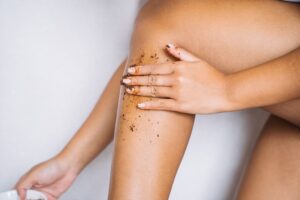Tips for Maximum Benefits

Exfoliation is an essential part of any skincare routine, as it helps to remove dead skin cells and promote healthy skin cell turnover. However, many people are unsure of the dos and don’ts of exfoliation, which can lead to improper use of exfoliating products and potential damage to the skin. In this blog post, we will discuss the dos and don’ts of exfoliation to help you achieve healthy, glowing skin.
Do: Choose the Right Exfoliant for Your Skin Type
One of the most important things to consider when exfoliating is your skin type. Different skin types require different types of exfoliants, so it’s important to choose an exfoliant that is appropriate for your skin. If you have sensitive skin, opt for a gentle exfoliant that is free of harsh chemicals and abrasive particles. If you have oily skin, you may benefit from a stronger exfoliant that can help to unclog pores and remove excess oil.
Don’t: Over-Exfoliate
While it may be tempting to exfoliate your skin every day, over-exfoliating can actually do more harm than good. Excessive exfoliation can lead to dryness, irritation, and even damage to the skin barrier. It’s important to limit exfoliation to once or twice a week, depending on your skin type and the type of exfoliant you are using.
Do: Use a Gentle Touch
When exfoliating, it’s important to use a gentle touch to avoid damaging the skin. Scrubbing too hard can cause irritation and even lead to broken blood vessels. Instead, use gentle circular motions to massage the exfoliant into your skin, and rinse thoroughly with lukewarm water.
Don’t: Exfoliate Active Acne
If you have active acne, it’s best to avoid exfoliating those areas altogether. Exfoliating over active acne can irritate the skin and potentially spread bacteria, leading to more breakouts. Instead, focus on gentle cleansing and spot treatments to help calm acne-prone skin.
Do: Moisturize After Exfoliating
After exfoliating, it’s important to moisturize your skin to help replenish moisture and protect your skin barrier. Look for a moisturizer that is lightweight and non-comedogenic, so it won’t clog pores. Applying moisturizer after exfoliating can also help to soothe any irritation and keep your skin looking and feeling smooth and healthy.

Don’t: Exfoliate Sunburned or Inflamed Skin
If you have sunburned or inflamed skin, it’s best to avoid exfoliating those areas until they have fully healed. Exfoliating over damaged skin can further irritate the skin and potentially lead to scarring. Instead, focus on gentle cleansing and soothing treatments to help heal and hydrate the skin.
Conclusion
In addition to the dos and don’ts of exfoliation, there are a few other tips to keep in mind when incorporating exfoliation into your skincare routine. For example, it’s important to patch test new exfoliants before using them all over your face, to ensure that you don’t have an allergic reaction or experience irritation. It’s also a good idea to avoid exfoliating before any major events or activities, as your skin may be more sensitive and prone to irritation.
When it comes to choosing exfoliants, there are many different types to choose from. Some of the most popular types of exfoliants include physical exfoliants, such as scrubs and brushes, and chemical exfoliants, such as alpha and beta hydroxy acids. It’s important to do your research and choose an exfoliant that is appropriate for your skin type and concerns.




